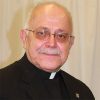Dust to Dust
When it comes to Ash Wednesday, I am definitely “old school.” I have nothing against telling people—or hearing—“Repent and believe the Good News!” but this admonition lacks the sobering, gut-wrenching: “Remember you are dust and unto dust you shall return.”
We are, every single one of us, going to die. We spend a lot of time and energy avoiding this truth. That’s why it’s all the more important that the Church confront us with it as we enter the holy season of Lent. It’s an invitation to wrestle with the angel of our mortality. On Ash Wednesday we bear the mark of the cross on our foreheads as a reminder: use your limited time wisely.
We humans have been blessed—and cursed—with the awareness of our mortality. Knowing we will one day die gives rise to the eternal questions: Where did I come from? Where will I go? Why am I here? And what is the meaning of life? Great novels, paintings, poetry, sculptures, symphonies and songs attempt to answer these questions by raising our spirits and seeming to transcend death.
Yet the curse of our foreknowledge of death also gives rise to the darker side of human existence: excessive drinking, gambling, drugs, promiscuity, pornography, violence, and in recent years, the Internet, anything to keep us from thinking too much about death. Even work can be an attempt to fill or ignore the void in our hearts that taunts us with the possibility that life is not only short but ultimately meaningless.
Enter the Church: “Remember you are dust and unto dust you shall return.” Lent begins, not by helping us flee, ignore or disguise our mortality, but by boldly facing it. In this regard, Karl Marx was wrong. Religion, when properly understood and practiced, is not the “opiate of the masses,” but rather the clarion call to be fully awake and aware. Likewise, our Lenten sacrifices strip us of the emotional clutter with which things and habits cloud our thoughts so we can focus on and appreciate what really matters.
Here again, I am “old school.” I have nothing against doing good and saying extra prayers during Lent. These should be done anyway, year-round. But Lent invites us to turn off the “automatic pilot” of our lives and approach our day with mindfulness and detachment. For example, rather than mindlessly drinking 10 cups of coffee each day, I give it up altogether. Sure it’s difficult. I try not to get too cranky. (As a colleague observed: “Every time you give up coffee, we do penance!”) Mostly I find it hard to stay awake after 8 p.m. during those decaffeinated 40 days! But come Holy Thursday (when Lent officially ends), I blissfully savor that first cup of heavenly coffee, giving thanks to God for such a sublime beverage.
Fasting and abstinence should not make us proud to be penitent but help us to be more aware of those for whom going without food and luxuries is not an option. They foster solidarity with the less fortunate, especially if we donate the cost of that cheeseburger or caffè latte to a local soup kitchen.
Then on Holy Thursday, each mouthful of food makes us mindful of—and grateful for—the ultimate heavenly food: the Eucharist.
At their core, Ash Wednesday and Lent are acts of discipleship as we pick up the cross of our mortality and follow Jesus to Calvary. When it comes to death, the only way around is through. Jesus does not remove death—just as he does not remove sin—but through his Cross he defangs the paralyzing fear of death and thereby deflates the power of sin.
Yes, we are dust. Stardust! In faith we embrace our mortality, confident that the One who fashioned us from the stuff of stars and created us in the divine image will also raise us up on the Last Day. With Job we say, “As for me, I know that my redeemer lives and he will at last stand forth upon the dust. …And from my flesh I shall see God.” (Job 19:25–26)
Featured image: A woman receives ashes at St. Francis of Assisi Church in New York City. (O. Duran/U.S.)

